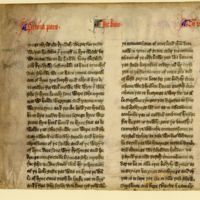Fragmenta Manuscripta
Pseudo-Bonaventure, Ludolphus of Saxony
The Meditationes or Mediations on the Life of Christ was originally believed to have been written by Bonaventure (1221-1274) but now is attributed to an unknown Franciscan author named the pseudo-Bonaventure. The text was an instant hit, with over 200 surviving manuscripts from the fourteenth century including editions in many of the major European vernaculars. The Meditiones encouraged the reader to imagine the pain and suffering of Christ and the Virgin during their private devotional practices.[1]
With so little of the text available to us on this small fragment, it is difficult to precisely identify the text it came from. This may have been part of another version of the Life of Christ written by Ludolphus/Ludolph of Saxony (c. 1295-1378). Ludolph’s Vita Christi retold the story of Christ’s life and incorporated commentaries on the gospels and spiritual and moral lessons. Ludolph drew from a number of sources including James of Voragine (author of the Golden Legend) and the Pseudo-Bonaventure (author of the Meditationes), which is why it is so difficult to pinpoint the original text based on this surviving fragment. The Vita was immensely popular, with many surviving manuscript copies and print editions.[2] See Philosophy and Theology for similar works.
NOTES
[1] Sarah McNamer, "The Origins of the Meditationes vitae Christi," Speculum 84, issue 4 (2009): 905–955; Sarah McNamer, Meditations on the Life of Christ: The Short Italian Text (Notre Dame, Indiana: University of Notre Dame Press, 2018).
[2] “Ludolph of Saxony,” Encyclopedi.com, updated October 7, 2020, https://www.encyclopedia.com/religion/encyclopedias-almanacs-transcripts-and-maps/ludolph-saxony; Mougel, A. “Ludolph of Saxony,” in The Catholic Encyclopedia (New York: Robert Appleton Company, 1910), Retrieved September 22, 2020 from New Advent: http://www.newadvent.org/cathen/09416b.htm.
